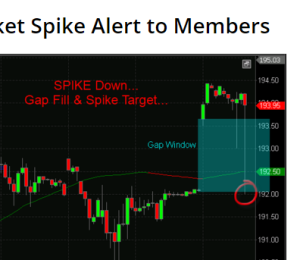Yesterday we took a look at how you might be feeling pretty jaded or even approaching the point of despair about your prospect of achieving the success you desire as a trader.
The first step toward becoming a great trader that enjoys the rewards that trading offers begins with being open to the belief that it is possible for you.
I reminded you (if you hadn't heard of it before) about the experiment that created the “Turtle Traders” which provided proof positive that great traders aren't born, they are made, and it demonstrated that regular people from different walks of life can indeed become very successful traders and in a reasonably short period of time. We'll come back to this story in a few minutes for a specific insight.
We left off yesterday by saying that you have what it takes personally, just as you are. But you're still not there yet, so why not?
Today we'll explore:
- What the Big Four are
- how they rob you of hundreds if not thousands of dollars every month
- how everyone is asking the wrong questions about them
- why the common and typical solutions don't work, at least not for long
- and finally the double-edged sword of experience and how it provides the answer to the problem
So let's jump right in, shall we?
1. The Big Four have been and continue to be the bane of nearly every trader on the planet, certainly for every struggling trader. These “Big Four” are the emotions of Greed, Fear, Hope and Despair.
2. They interfere on nearly every trade, every day with sound judgement and timely action. It is almost always one of these emotions causing you to hesitate, to over trade, to chase bad trades, to revenge trade, to deviate from your system, move you stops, stay in too long or get out too early. These emotions are the primary cause of untold losses and missed profits every day, week and month.
3. Now the daily experience for most traders includes the Big Four, and most make the assumption that these emotions are just a natural part of trading, and so ask questions like, “How can I control my emotions?” or “How can I find a way to over-ride them enough to ‘be disciplined' and stick to my rules?” It seems that no one thinks to question the assumption that trading is just naturally an emotional experience or examine how the situation of fighting with them daily came to be.
You see, you've moved into new occupations or tried new things at least once in your life, I'm sure, and while it might have been a bit nerve-wracking at first, it didn't take too awful long until you were comfortable and doing rather well. But with trading, the battle with the Big Four seems to be one that lasts indefinitely, and one that is the big reason that so many traders finally give up after years, empty-handed. No one seems to ask WHY?
4. If you read most of the books on “Trading Psychology”, watch most of the videos on YouTube, or go through most of the posts on blogs or forums, you'll find tons of the same comments, thoughts and ‘solutions' that have been floating around for decades. This discussion of dealing with the “Big Four” has been around for many years.
The problem is, nearly every conversation on the matter approaches it from a purely psychological perspective, which is logical, but flawed, and also accepting the assumption from above that these emotions are just an inherent part of trading.
Because of this, they tend to focus on the symptoms of the problem instead of the underlying root cause, and so usually have only temporary effects if any at all. You probably know what I'm talking about. If your head is in a vice clamp, and you keep taking aspirin to alleviate the pain, you may get some temporary relief from the pain, but your headache will continue to keep coming back until you get your head out of the vice.
5. When I first started trading, and I expect your experience was similar, I really didn't know much about it when I first started trading with real money. I learned the basics of how things work, opened an account and got busy. I mostly knew enough to be dangerous.
Because I started out not really knowing what I was doing, every trade was very emotionally charged, even when things went well. I made a LOT of mistakes and I was stressed out nearly every moment that I was in a trade.
For quite a long time, that was my trading experience: emotional, very stressful, filled with mistakes, and some pure luck. The Big Four were very much an integral part of my trading and I got used to it as being ‘normal'.
What really stunk was the fact I was having to figure most everything out myself through trial and error, hard lessons, sheer persistence. Sure I read books, watched videos, farted around on the forums. Between my own ignorance, the mix of good and bad ‘advice' out there and the information overload, it took a while to get my head around things and progress was painfully slow and a lot of ‘one step forward, two steps back'.
During those early months, because I was pretty much on my own, I established a lot of very counterproductive perspectives, habits, emotional response patterns and other things in my head that lingered for a LONG time. For all too long, it seems like I was mostly just practicing bad trading. On top of that, many of those stupid mistakes, painful losses and missed winners replayed in my head countless times during later trades.
Now for the Turtle Traders, they had the good fortune of starting off on the right path, establishing supportive habits, perspectives, and experiences for their normal, and so were able to achieve considerable success in a very reasonable period of time.
So here's the big Catch-22, the double-edged sword of experience:
Most traders only know the experience of emotional, stressful, frustrating trading, filled with mistakes and disappointment – because this is how they started out and this is the ‘normal' they've established
They can't get to experience the relaxed, confident, consistent trading they seek because they can't keep the Big Four out of their trading long enough to establish a different normal – Greed, Fear, Hope and Despair continue to be part of their daily trading experience, interfering with nearly every trade.
In trading as with any occupation, having experience is usually considered an asset, but sometimes, especially when it's been mostly bad experience and for a significant period of time, it can be more of a liability.
So how do you create an experience different from all you've known so far, if the ‘normal' you've established is very thoroughly ingrained?
Tomorrow, we'll take a look at the reason why it is so difficult and the 2 keys to making it happen, to change your experience so that you make the shift and establish a new and much more desirable, enjoyable and permanent ‘normal'
See you tomorrow!
Cheers
Brian McAboy
The Predictable Profits Engineer
P.S. I hope you're finding this series helpful. Please feel free to reply with your thoughts. I welcome the feedback!

